Introduction
The OpenAPI specification's 'allOf' property is a versatile tool for developers, allowing the consolidation of multiple schemas into a unified schema. This feature is particularly valuable in API-first design, where web APIs are treated as products. By leveraging 'allOf', developers can create complex data models by inheriting properties from multiple schemas, promoting code reuse and maintainability.
The use of 'allOf' aligns with the modern approach of treating APIs as programmable interfaces, empowering developers to build upon the work of others and craft APIs that can seamlessly evolve with emerging use cases. This article explores the benefits of using OpenAPI's 'allOf', including enhanced API clarity, improved code reusability, and streamlined API development. It also provides best practices for leveraging this feature and highlights real-world applications and use cases.
With the growing recognition of APIs as essential components in modern software development, OpenAPI's 'allOf' feature becomes a fundamental tool for building efficient, flexible, and user-centric APIs.
What is OpenAPI allOf?
The allOf property in OpenAPI is a versatile tool for developers, allowing the consolidation of multiple schemas into a unified schema. It's particularly useful in API-first design, a practice that aligns with the modern approach of treating web APIs as products. This method grants end-users control by replacing traditional GUIs with a programmable interface, fostering a product mindset focused on the developer's experience.
With allOf, you can create complex data models by inheriting properties from several schemas, fostering code reuse and maintainability. It's a step towards automation, empowering developers to build upon the work of others, including open-source contributors and internal teams, and to craft APIs that can seamlessly evolve with emerging use cases.
In practice, leveraging tools like openapi-typescript can automatically generate TypeScript types from your OpenAPI specifications. This minimizes human error and simplifies the developer experience by eliminating the need to manually write types or shift to other paradigms like GraphQL or tRPC, which can be considered over-engineering in some contexts.
Documentation plays a crucial role in this ecosystem. Clarity in categorizing information, such as Tutorials, Guides, and Reference materials, is essential for newcomers and contributors alike. Community-driven documentation efforts are critical to enhancing the learning curve and fostering contributions.
At the core of OpenAPI documentation are keywords that define the API's elements, including supported versions (openapi), general information (info), and available servers (servers). These components work in tandem to provide a clear, comprehensive description of the API, ensuring that developers can understand and implement it effectively.
Statistics underscore the growing adoption of APIs, with research indicating that 93% of organizations acknowledge their relevance and necessity. APIs are recognized for breaking down silos and enhancing data asset visibility, suggesting a bright future for API-centric architectures.
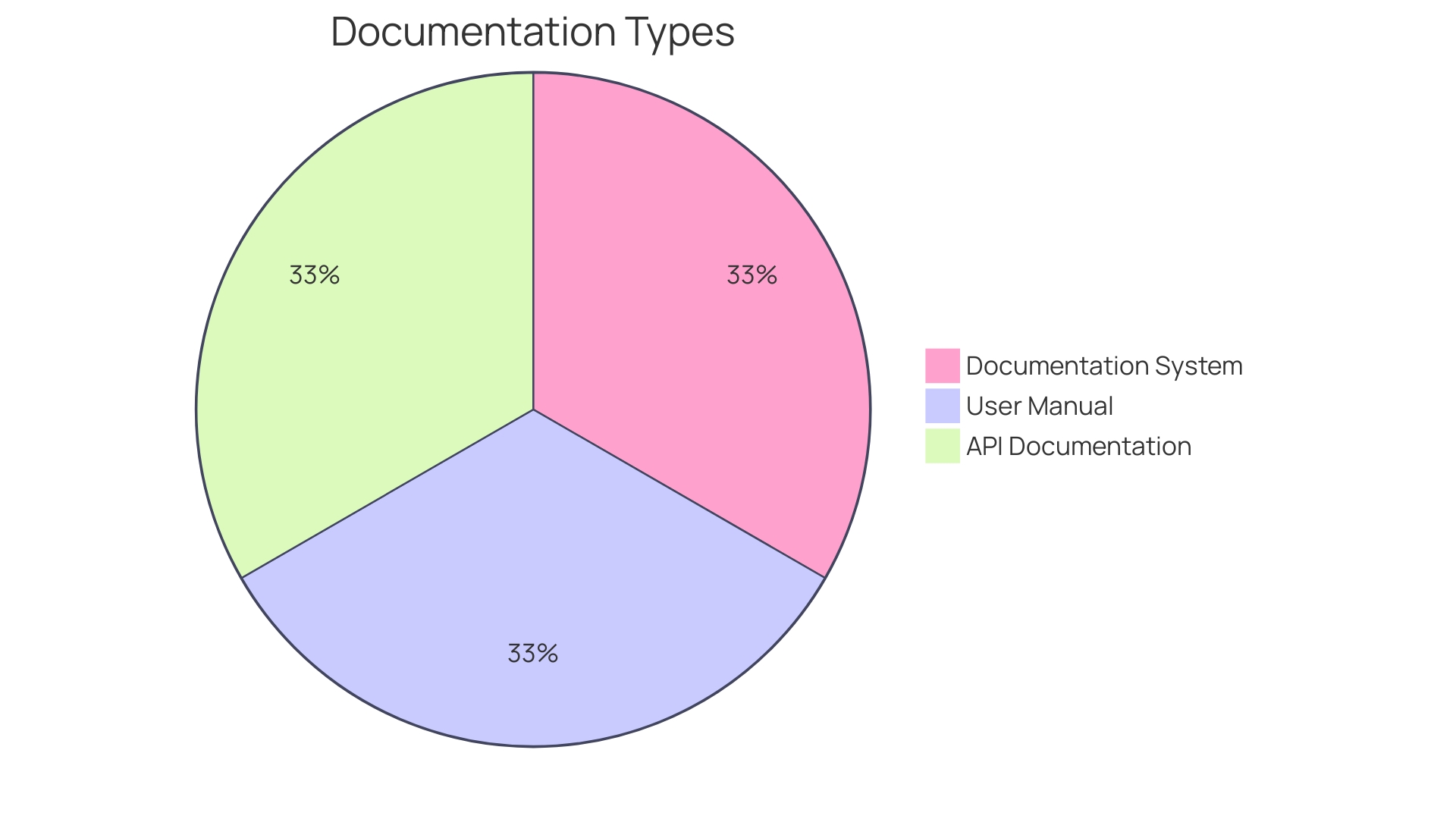
Benefits of Using OpenAPI allOf
In the realm of API development, the 'allOf' feature in OpenAPI specifications stands as a powerful tool to refine and extend your API descriptions. It offers a pathway to modular design, allowing developers to create complex schemas by combining simpler ones. This aligns with the API-first philosophy where digital products are conceived with APIs at the forefront, empowering end-users with flexible and programmable interfaces.
The use of 'allOf' not only streamlines the development process but also resonates with the product mindset that prioritizes the goals, journey, and experiences of API consumers—developers in this context. It facilitates an environment where automation thrives, unlocking a spectrum of emergent use cases through collaboration with external partners, open-source contributors, and other internal product teams.
Moreover, the practice of API-design-first is echoed in the experiences of GitHub's Docs Engineering team, which moved towards data-driven documentation. Their adoption of JSON for content and intercommunication within their documentation platform showcases the benefits of such an approach.
With the surge in API adoption, underscored by a Vanson Bourne research indicating that 93% of organizations deem APIs crucial to their operations, the 'allOf' feature becomes essential. It not only enhances API clarity but also amplifies the reusability of components, as seen with tools like TypeSpec that promote the creation of reusable API components.
Leveraging OpenAPI's 'allOf' can dramatically impact the efficiency of API development, ensuring that the documentation is precise and that the intended use of parameters is crystal clear. This clarity is crucial, as it answers fundamental questions about the data being exchanged, such as what specific data needs to be uploaded and under what circumstances it should be used. It's a strategy that not only supports the maintenance of a vast platform like GitHub but also aligns with the growing appreciation for open-source software's collaborative and transparent nature.
In essence, the 'allOf' feature is a testament to the evolving landscape of API development, where efficiency, clarity, and reusability are not just desired but expected.
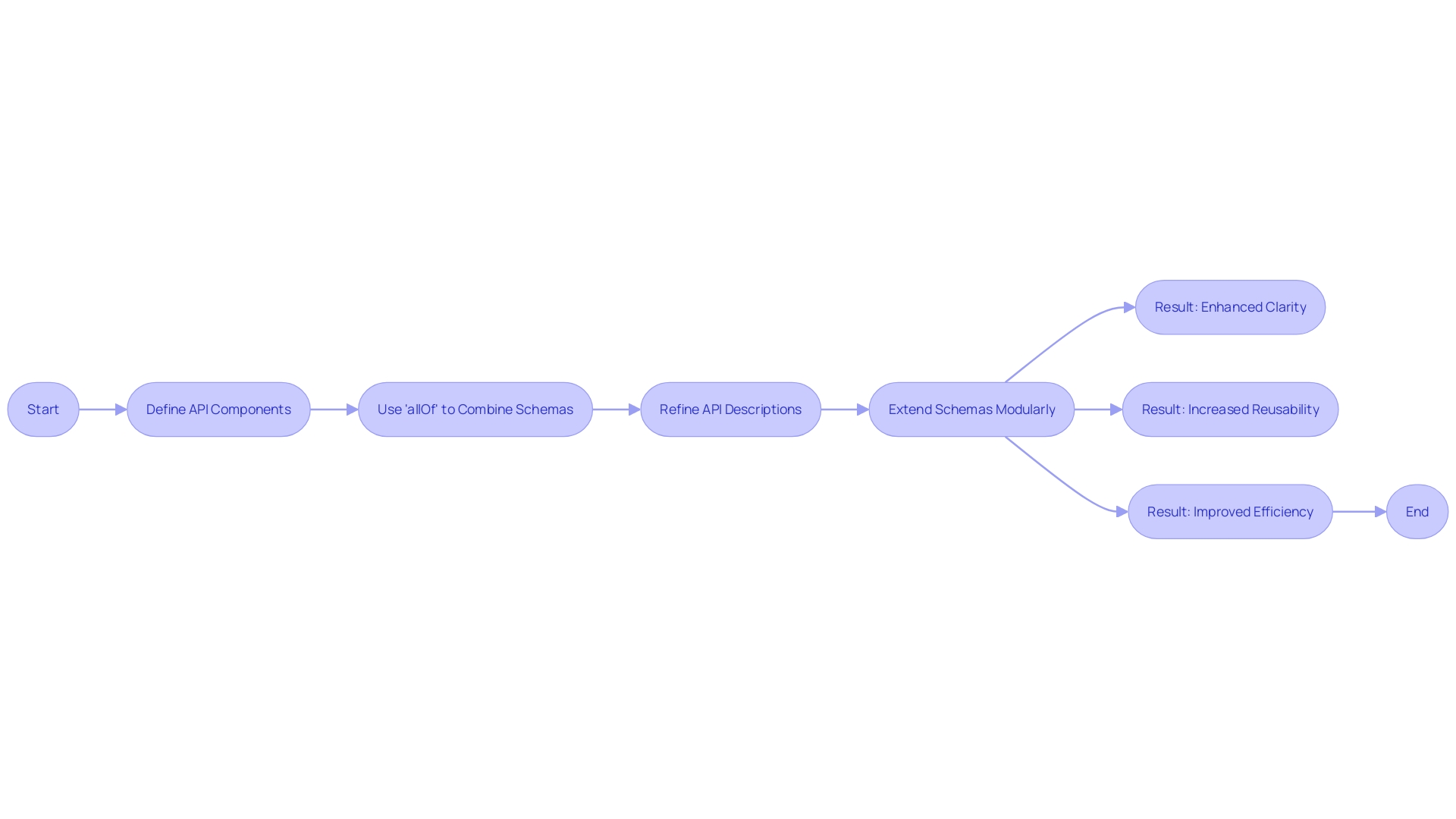
Enhancing API Schema Flexibility with allOf
OpenAPI's all Of feature empowers developers to construct intricate and nuanced API schemas, a capability that's becoming increasingly crucial as web APIs evolve into primary products and digital offerings take an API-first approach. This focus on API-first design is more than a trend; it's a strategic move towards granting end-users greater control through a programmable interface over traditional GUIs, thereby fostering a rich ecosystem of automation, third-party integrations, and innovative use cases.
A vivid example of this is seen in how APIs are now designed with the developer's journey in mind—a testament to the importance of a well-thought-out API that serves as the bedrock of user experience. With all Of, schemas can be modularly designed and combined, answering the growing demand for flexibility in API development, where questions like 'What data to upload?' and 'Which parameters to use?'
are resolved with clarity and precision.
The significance of such flexibility is underscored by alarming statistics from the cybersecurity realm, where 78% of teams have encountered API-related incidents within a year. Moreover, while 72% have a full inventory of APIs, only 40% have visibility into which handle sensitive data. This heightens the priority for secure and well-structured APIs—an area where OpenAPI's allOf can contribute by fostering clear and robust schema definitions.
These insights are not just theoretical; they're echoed by industry leaders who emphasize the transformative role of APIs. As APIs continue to be the backbone of modern software, with 93% of organizations recognizing their essential role, the all Of feature stands out as a key facilitator for creating APIs that are not only functionally rich but also secure, user-centric, and ready to meet the challenges of the digital landscape.
Improving Code Reusability
OpenAPI's all Of feature is a powerful asset for developers seeking to foster code reusability and maintainability. It enables the definition of common components that can be seamlessly integrated across various sections of an API specification. When we consider the practice of treating APIs as the core of digital products, this feature takes on even greater significance.
It allows developers to construct flexible and programmable interfaces that cater to the specific goals, journeys, and experiences of their end-users - the developers themselves.
By leveraging OpenAPI's allOf, you can effectively reduce code redundancy and streamline your API's structure. This mirrors the trend in API-first development where the focus is on crafting versatile, user-centric APIs that can be easily manipulated and repurposed by external partners, internal product teams, and open-source contributors. The all Of feature supports this by simplifying the integration process and encouraging a modular approach to API design.
Moreover, OpenAPI specifications play a crucial role beyond just documentation; they contribute to the overall security of your API by defining clear rules and parameters for data exchange. With cyber threats on the rise, utilizing OpenAPI to its full extent, including features like allOf, becomes integral to safeguarding interfaces and the sensitive data they handle.
As digital landscapes evolve and software becomes increasingly reliant on open source components, maintaining an updated and secure API with OpenAPI and its all Of capability is not just a best practice but a necessity. The 2024 OSSRA report highlights the ubiquity of open source in commercial codebases, with a staggering 96% of reviewed applications containing open source components. Maintaining a Software Bill of Materials (SBOM) and regularly updating open source libraries are essential steps in mitigating risks.
In conclusion, OpenAPI's allOf is much more than a convenience; it is a fundamental feature that enables developers to build secure, maintainable, and versatile APIs in line with the API-first philosophy. It underscores the importance of clear, modular, and reusable design principles that are critical for modern software development and the security of digital products.
Streamlining API Development
Embracing an API-first design approach transforms the way software systems are developed. By prioritizing the API at the very beginning, you construct a solid, user-friendly foundation that the rest of the application can build upon. This methodology positions APIs as crucial building blocks in the development process, ensuring they are not treated as an afterthought but as essential components.
OpenAPI has become a cornerstone for developers who subscribe to this philosophy. It empowers them to define and create clear, modular API schemas. This is where OpenAPI's allOf functionality shines, allowing the combination of multiple schemas into one, thereby promoting reusability and reducing complexity.
For instance, all Of can be used to create a composite schema that merges common parameters, fostering both clarity and efficiency in API design.
Furthermore, detailed and articulate API documentation is no longer a bonus but a necessity. It elevates the developer experience by providing clear guidance on operations, parameters, and endpoints, thus minimizing support costs and guesswork. Instead of a mere GET /users, a well-documented API would explain the purpose of the endpoint, the nature of the data it returns, and the context in which it should be used.
This approach is mirrored in the real world by innovative companies like Contentsquare, which utilizes microservices and Apache Kafka for efficient notification delivery. Their API landscape is a testament to the power of modular design and the strategic importance of APIs in contemporary software development.
Statistics also underscore the growing relevance of APIs. According to Vanson Bourne's 2021 research, 'The State of APIs, Integration, and Microservices,' 93% of organizations recognize the critical role of APIs, with 86% acknowledging that APIs help avoid operational silos. As APIs continue to be integrated into business strategies, their ability to unlock and make data more accessible becomes increasingly clear.
By leveraging OpenAPI's allOf feature and adhering to an API-first design philosophy, developers can create more adaptable, robust, and user-centric APIs, ensuring that APIs serve as powerful tools in an organization's digital arsenal.
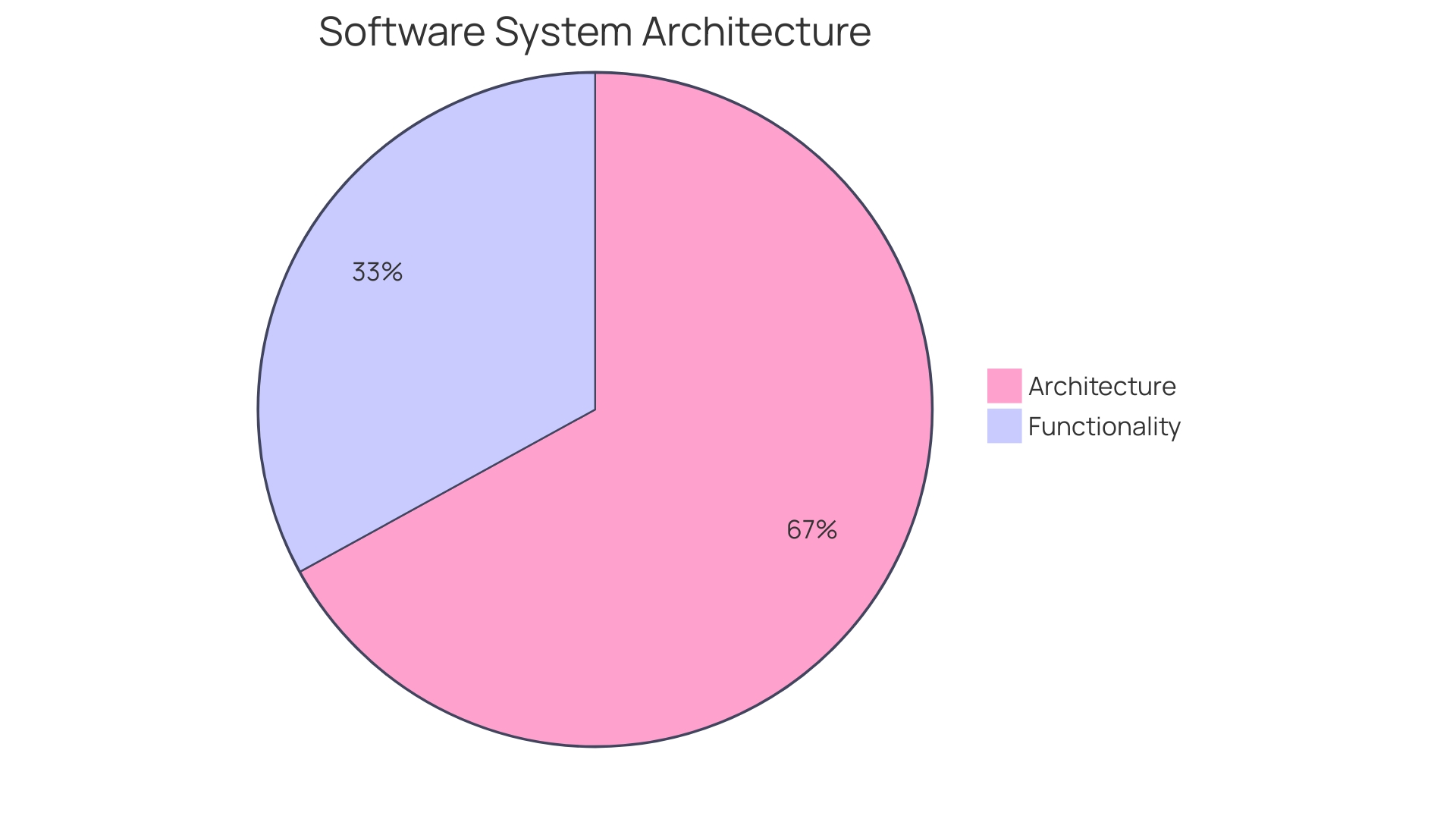
Ensuring Consistency and Compatibility
The OpenAPI specification's all Of property is a cornerstone for standardizing and streamlining API design. By leveraging all Of, developers can ensure that various components of an API inherit properties consistently, leading to a uniform structure and predictable behavior. This feature is particularly crucial when considering the complexities of large-scale platforms like GitHub, where consistent and error-free documentation is pivotal.
GitHub's transition to a dynamic application at docs.github.com illustrates the significance of structured documentation. The allOf property supports this by enabling clear and maintainable documentation, which is essential for GitHub's vast functionality and user base.
Moreover, the introduction of new standards such as Matter 1.2, which emphasizes interoperability and security for a variety of device types, underscores the importance of APIs adhering to consistent validation and serialization practices. The all Of feature aligns with the philosophy of using consistent naming conventions and data validation processes across all endpoints, as advocated by software engineers Rachael Sewell and Robert Sese from GitHub's Docs Engineering team.
Adopting a data-driven approach to documentation and API design, as GitHub has done, is backed by statistics showing the increasing relevance of APIs in organizations. According to Vanson Bourne's research, 'The State of APIs, Integration, and Microservices,' 93% of organizations acknowledge the critical role of APIs, with 97% agreeing on the synergies between APIs and microservices. This data-driven approach, facilitated by features like all Of, ensures that APIs are not only functional but also intuitive, leading to higher productivity and customer satisfaction.
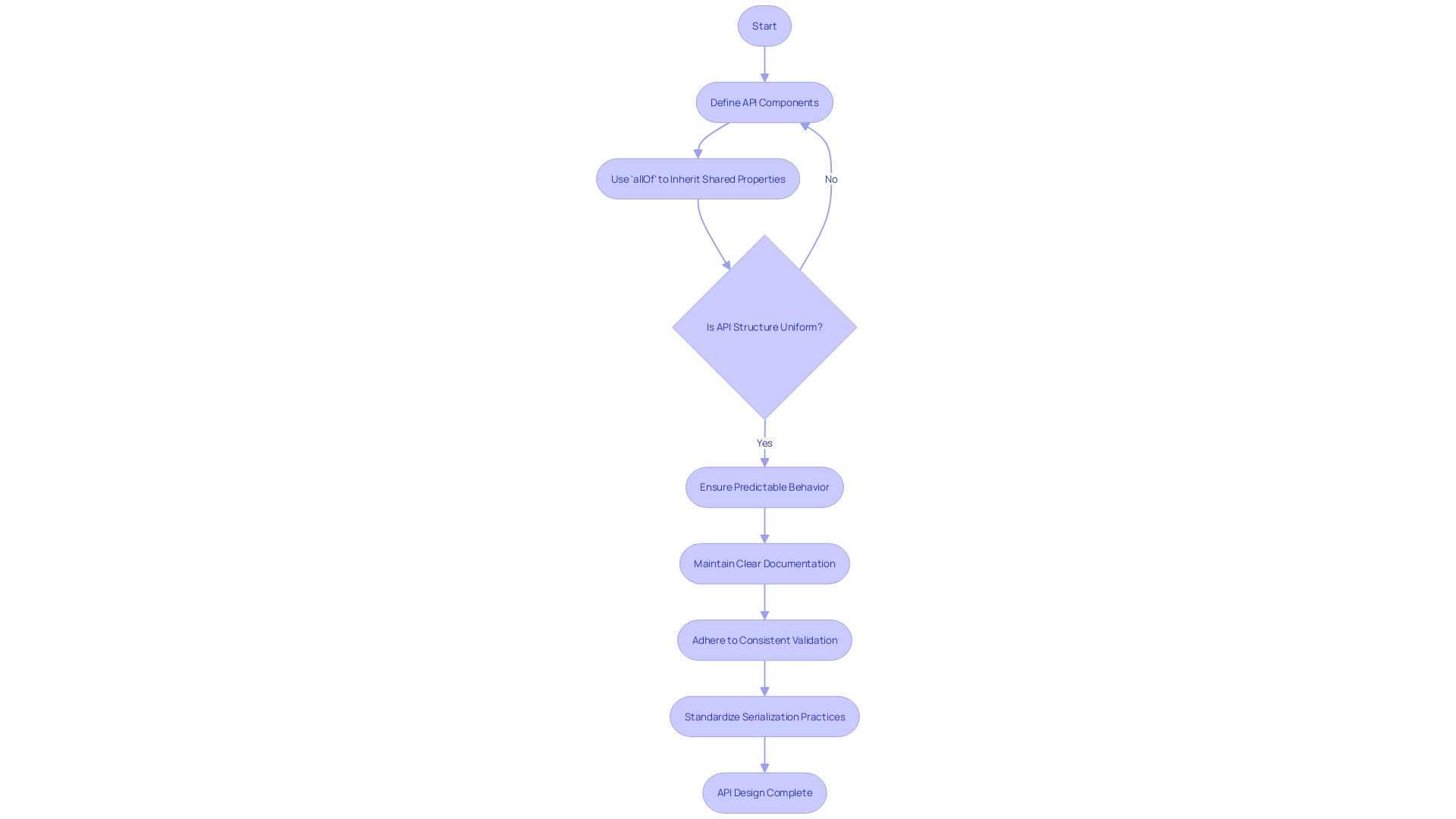
Best Practices for Using OpenAPI allOf
Leveraging OpenAPI's all Of feature can optimize the structure and reusability of your API schemas. To harness its full potential, consistency is key. Always use uniform names for identical data across requests and responses, and ensure that data is validated consistently.
This coherence simplifies understanding and enhances the usability of your API.
For instance, when defining a parameter, clarity is critical. Questions like “What does this endpoint do? What’s the purpose of this parameter?
When should it be used?” should have straightforward answers. If the parameter is for data upload, specify the exact nature of the data and its relevance to the user.
A well-documented OpenAPI specification enhances collaboration and productivity, as observed in a case study at California State University. Post-workshop metrics showed that users tripled their API collections and updated them 31 times more often, indicating more efficient and frequent use.
With the increasing prevalence of API integration in businesses, as highlighted by a Vanson Bourne study, 93% of organizations recognize APIs as crucial to breaking down silos and improving data visibility. Consistent, well-documented APIs not only prevent breaches but also enable organizations to leverage their full suite of services for better customer satisfaction and improved productivity.
Adopting these best practices and maintaining a robust standard for your OpenAPI implementation is not just about following a set of rules; it represents a commitment to quality and security in an age where digital platforms are indispensable.
Handling Common Pitfalls
As we delve into the intricacies of OpenAPI, particularly the all Of construct, it's imperative to navigate common pitfalls that can arise. For instance, while all allows for the combination of multiple schemas, it can also introduce complexity, leading to misunderstandings and potential misuse. A poignant example is when API errors are communicated inconsistently, resulting in a varied landscape of error formats, each with unique assumptions and complications.
This not only complicates error handling for developers but also hinders the smooth interaction between systems, as highlighted in a two-part series on Problem Details.
Furthermore, the adoption of certain conventions, such as prefixing unstandardized parameters with "X-", has historically been a practice rooted more in tradition than in utility. Over time, this has caused more confusion than clarity, prompting official deprecation in favor of more meaningful standards. The evolution of best practices in software development often reveals that what was once considered the norm may no longer be the most effective approach, as discussed in RFC 6648.
Adding to the complexity is the juxtaposition of simplicity and underlying intricacies in protocols like OAuth. While on the surface, OAuth's ease of implementation has led to widespread adoption for user authorization and authentication, it consists of multiple components that demand a comprehensive understanding to ensure secure and functional integration.
Moreover, the API landscape is continuously evolving, with organizations like SmartBear playing a pivotal role in fostering an active peer-to-peer community and advocating for ethical corporate practices. In this dynamic environment, it becomes increasingly important to choose the right tools—whether it's building custom OpenAPI tools or leveraging the extensive ecosystem of existing ones, as each choice should be tailored to the unique requirements and context of the project.
Ultimately, achieving an optimal level of standardization and consistency across APIs requires a methodical approach. This involves adhering to precise naming conventions, validating data uniformly, and maintaining consistent endpoint structures, as suggested by industry experts. By doing so, developers can ensure that their APIs are not only robust and user-friendly but also lend themselves to a more streamlined and efficient integration process.
Automated Code Generation and Documentation
The OpenAPI specification is a powerful tool that simplifies the creation and maintenance of APIs. It offers a standardized, language-agnostic way to describe RESTful APIs, ensuring that both humans and computers can understand the capabilities of a service without direct access to the source code. OpenAPI's allOf keyword exemplifies this by allowing developers to combine multiple schemas into one, thereby creating a unified representation of complex data structures.
This can be particularly beneficial when automating code generation and documentation, as it can encapsulate intricate data relationships.
For instance, if a developer is tasked with creating an application to analyze a user's dining expenses over time, they could utilize OpenAPI's allOf to merge schemas representing different aspects of the user's financial data. This merging would facilitate the generation of comprehensive code and documentation, which reflects all the necessary attributes such as the number of restaurant visits, total expenses, and average cost per visit. Essentially, by leveraging OpenAPI and tools that support it, developers can streamline the process of building robust, scalable, and well-documented APIs, which could be used to generate insightful financial graphs or other data representations.
This approach not only saves time but also ensures that the resulting applications are built on a solid foundation of clarity and precision in their API design.
Real-World Applications and Use Cases
The OpenAPI specification's 'allOf' property plays a crucial role in handling complex data structures, allowing developers to define a schema composed of several other schemas. For instance, consider the needs of a user who wishes to aggregate their restaurant expenses over a year. Using 'allOf', developers can create comprehensive API responses that combine detailed restaurant visit counts, total expenditures, and average costs per visit into one seamless output.
This method not only simplifies the data retrieval process but also enhances the end-user experience by providing a clear, unified view of their spending patterns.
Moreover, examining GitHub's approach to documentation underscores the significance of well-structured API design. GitHub's transition to a dynamic documentation platform at docs.github.com was driven by the need to manage an extensive array of functionalities and provide clear, concise information to more than 100 million users. By leveraging 'allOf', GitHub's documentation can merge various API endpoints and parameters into coherent units, facilitating both internal and external comprehension.
The versatility of 'allOf' is further emphasized when APIs are viewed as products themselves, with businesses offering a programmable interface over their domain, thus fostering automation and the emergence of new use-cases. In an API-first ecosystem, questions like 'What does this endpoint do?' and 'What specific data should be uploaded?'
are addressed by leveraging the full descriptive power of OpenAPI specifications. The 'allOf' feature ensures that developers have a precise understanding of the API's capabilities, leading to more effective and innovative applications.
Statistics highlight the predominance of OpenAPI in the industry, with a repository containing over 4,000 definitions, where major companies like Amazon, Google, and Microsoft are key contributors. Furthermore, research by Vanson Bourne in 2021 found that 93% of organizations consider APIs crucial, and 97% believe that APIs and microservices should be integrated for optimal performance. This data not only reflects the wide acceptance and necessity of APIs but also the potential for OpenAPI's 'allOf' to play a transformative role in the development and integration of digital services.
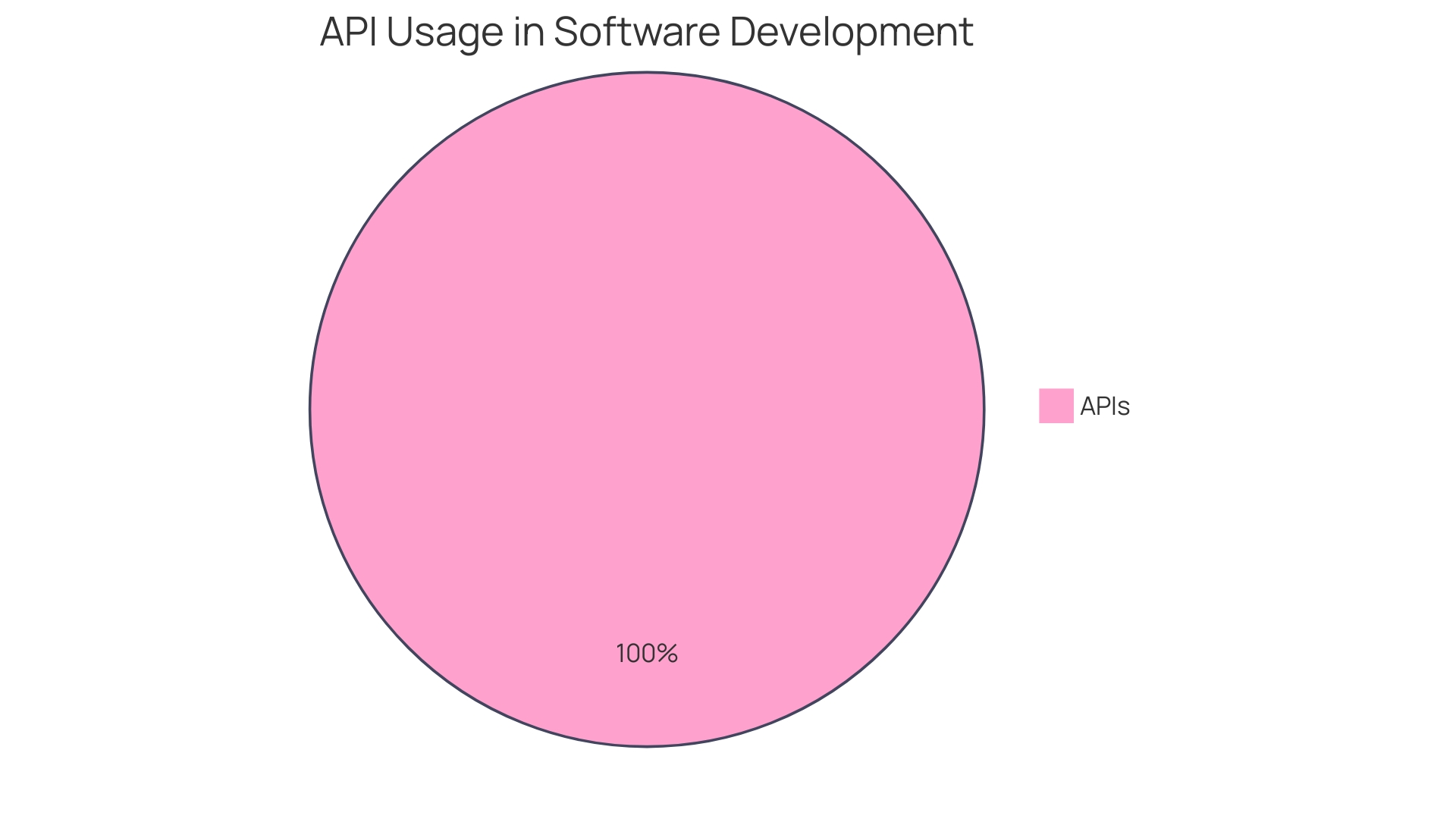
Conclusion
In conclusion, OpenAPI's 'allOf' feature is a powerful tool for developers in API-first design. It allows the consolidation of multiple schemas, promoting code reuse and maintainability. By leveraging 'allOf', developers can enhance API clarity, improve code reusability, and streamline API development.
The 'allOf' feature enables the creation of complex data models by inheriting properties from multiple schemas. This promotes code reuse and maintainability, leading to more efficient API development. It also supports the integration of common components across different sections of an API specification, enhancing code reusability and enabling the creation of versatile and user-centric APIs.
OpenAPI's 'allOf' empowers developers to construct flexible and nuanced API schemas, catering to the specific goals, journeys, and experiences of end-users. This promotes automation, third-party integrations, and innovative use cases. By following best practices, such as maintaining uniform naming conventions and validating data consistently, developers can optimize the structure and reusability of their API schemas.
In the evolving landscape of API development, OpenAPI's 'allOf' feature becomes a fundamental tool for building efficient, flexible, and user-centric APIs. It aligns with the API-first philosophy and the growing recognition of APIs as essential components in modern software development.
By leveraging the power of 'allOf', developers can create APIs that meet the evolving needs of users and drive maximum efficiency and productivity. It is a testament to the importance of clear, modular, and reusable design principles that are critical for modern software development and the security of digital products.
Frequently Asked Questions
What is OpenAPI allOf?
OpenAPI allOf is a property that allows developers to combine multiple schemas into one unified schema within OpenAPI specifications. It's used to create complex data models by inheriting properties from several schemas, which facilitates code reuse and maintainability.
Why is the allOf property useful in API development?
The allOf property is useful because it supports a modular approach to API design, allowing for the creation of complex schemas by combining simpler ones. This enhances the developer experience by enabling automation, promoting a product mindset, and ensuring APIs can evolve to meet new use cases.
How does allOf contribute to an API-first design approach?
allOf aligns with the API-first design philosophy by allowing developers to focus on building flexible, programmable interfaces from the start. This creates a foundation for automation, third-party integrations, and innovative use-cases, putting the needs of API consumers at the forefront.
Can OpenAPI allOf help with code generation and documentation?
Yes, leveraging tools like openapi-typescript, developers can automatically generate TypeScript types from OpenAPI specifications, which minimizes human error and streamlines the development process. Documentation clarity is also enhanced, allowing developers to understand and implement APIs more effectively.
What role does allOf play in API schema flexibility?
OpenAPI's allOf feature allows for the construction of intricate and nuanced API schemas, providing the flexibility needed to adapt to the evolving demands of API development. It enables clear definitions of data exchange, which is particularly important in the context of cybersecurity.
How does allOf improve code reusability?
By enabling the definition of common components that can be used across various sections of an API specification, allOf reduces code redundancy and streamlines the API's structure. It encourages a modular approach to design, improving integration and fostering code reusability.
What are the benefits of using OpenAPI allOf?
Benefits of using OpenAPI allOf include streamlined API development, increased efficiency, enhanced clarity, and improved reusability of API components. It also contributes to the overall security of the API by defining clear rules and parameters for data exchange.
How does allOf ensure consistency and compatibility in APIs?
The allOf property helps standardize API design by ensuring consistent inheritance of properties across various components, which leads to a uniform structure and predictable behavior. This is crucial for large-scale platforms that require consistent and error-free documentation.
What are some best practices for using OpenAPI allOf?
Best practices include using uniform names for identical data across requests and responses, ensuring consistent data validation, and maintaining clear definitions for parameters. This coherence enhances the usability and security of your API.
What common pitfalls should be avoided when using allOf?
Common pitfalls include introducing unnecessary complexity, communicating API errors inconsistently, and adhering to outdated conventions. Developers should strive for standardization and consistency, and choose the right tools for their project to avoid these issues.
What are some real-world applications of OpenAPI allOf?
Real-world applications include defining complex data structures for end-user interfaces, such as aggregating restaurant expenses or managing extensive documentation platforms like GitHub. allOf enables a clear and unified presentation of data, improving both internal and external comprehension of APIs.




